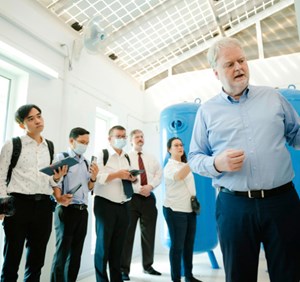News
Enapter AG launches Southeast Asia’s first H2 learning center with partners in Thailand
Enapter AG and its partners launched a project to create Southeast Asia’s first green H2 learning center, in Chiang Mai, Thailand. Initiated with a contract signing ceremony and visit to the Phi Suea House H2 showcase, the project will be a partnership between Enapter, the German state-owned organization GIZ, and Chiang Mai University’s Energy Research and Development Institute of Nakornping.
The green H2 knowledge hub in Chiang Mai will consist of a training center developing and offering hands-on courses using state-of-the art technology, and a unique green H2 demonstration site. By training project developers, integrators and other energy professionals, the center will enable the growth of H2 infrastructure in the region, promote regional cooperation and help position Chiang Mai and Thailand as pioneers in modular H2 system technology.
Green H2, produced from renewable energy sources, has emerged as one of the most promising alternatives to fossil fuels. Thailand has set ambitious decarbonization goals and sees H2 as a key element in achieving these targets, with this cooperation between the Thai and German public and private sectors set to play a role in supporting Thailand’s national goals.
The project is being implemented via the International H2 Ramp-up Program, an initiative carried out by the GIZ on behalf of the German Federal Ministry for Economic Affairs and Climate Action. It builds on the progress made thanks to the Phi Suea House in Chiang Mai, a multi-house residence that in 2015 became the world’s first self-sustaining development powered by a clean energy system based on H2 energy storage. The European Commission in 2021 named it as one of 32 H2 Valley large-scale H2 flagship projects around the world.
Phi Suea House was developed by Enapter CEO Sebastian-Justus Schmidt to showcase combined solar and green H2 tech feasibility–and has evolved into a hub of H2 activity and a technology prototyping sandbox. It will be part of the partnership to set up the knowledge center.
Sebastian-Justus Schmidt, said, “Every new technology first goes through a learning phase. The doubts that arise at the beginning can be reliably dispelled with education and knowledge transfer. This project will act like a green H2 lighthouse for the region and make Thailand, and especially Chiang Mai, known as a knowledge center in H2, even beyond the country’s borders.”
Simon Rolland, Energy portfolio Program Director, GIZ, said, “Today marks a defining moment in our pursuit of a greener and more sustainable future. The establishment of the green H2 knowledge hub in Chiang Mai is a clear demonstration of our unwavering commitment to clean energy and sustainable development. This project will not only provide a training ground for future project developers, but also serve as a model that showcases the viability of green H2 systems. With the combined efforts of CMU, Enapter, and GIZ, we are bringing together a wealth of knowledge and expertise that will make Chiang Mai a hub for innovation throughout Southeast Asia.”
Pongruk Sribanditmongkol, M.D., Ph.D., President, CMU, said, “This is crucial in addressing the issue of climate change and reducing greenhouse gas emissions. We are proud to be a part of this important initiative and look forward to working together to make a positive impact on the environment.”


